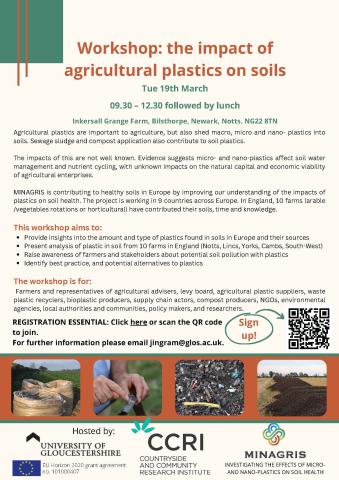Plastic plays an important role in agriculture and is used to produce weed suppressant mulches, silage wrap, netting and more. Whilst useful for agricultural production, these items shed macro, micro and nano- plastics, the impacts of which are largely unknown. Other sources of micro- and nano-plastics in agricultural soils include sewage sludge and compost. Existing evidence suggests that micro- and nano-plastics in agricultural soils may affect ecosystem services such as soil water dynamics and nutrient cycling, whilst having an unknown impact on the natural capital and economic viability of agricultural enterprises.
MINAGRIS aims to contribute to healthy soils in Europe by providing a deeper understanding and tools to assess the impact of microplastics and nanoplastics in agricultural soil health. The project is working with 11 case studies across Europe. In the case study in England we have been interviewing farmers and sampling soil from 10 farms (arable with vegetables in rotations or horticultural).
This workshop aims to:
- provide insights into the amount and type of plastics found in soils in Europe and the sources of these plastics
- present analysis of plastic in soil from 10 farms across England (Nottinghamshire, Lincs, Yorks, Cambs, South-West)
- raise awareness of farmers and stakeholders about potential soil pollution with plastics
- identify best practice, and potential alternatives to plastics
The workshop is for farmers and representatives of agricultural advisers, levy board, agricultural plastic suppliers, waste plastic recyclers, bioplastic producers, supply chain actors, compost producers, NGOs, environmental agencies, local authorities and communities, policy makers, and researchers.
Project Information: This workshop is part of the EU funded MINAGRIS project INVESTIGATING THE EFFECTS OF MICRO- AND NANO-PLASTICS ON SOIL HEALTH project https://www.minagris.eu/index.php
For further information please email jingram@glos.ac.uk


